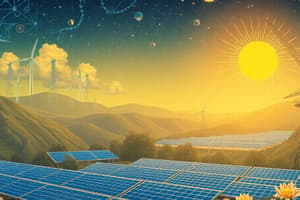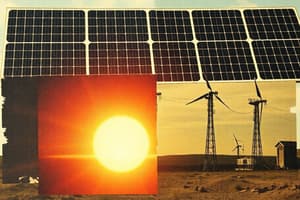Podcast
Questions and Answers
What is the primary function of photovoltaic cells?
What is the primary function of photovoltaic cells?
- To store excess energy generated by solar panels
- To convert sunlight into electrical energy through the photovoltaic effect (correct)
- To convert electrical energy into sunlight
- To release electrons when exposed to electrical energy
What is the primary factor affecting the efficiency of solar panels?
What is the primary factor affecting the efficiency of solar panels?
- Type of photovoltaic cell used (correct)
- Roof size and orientation
- Temperature
- Local building codes and regulations
What is the purpose of energy storage systems in renewable energy systems?
What is the purpose of energy storage systems in renewable energy systems?
- To convert electrical energy into sunlight
- To reduce greenhouse gas emissions
- To store excess energy generated by solar panels for later use (correct)
- To generate excess energy during peak demand
Which type of solar panel installation is most suitable for areas with limited roof space?
Which type of solar panel installation is most suitable for areas with limited roof space?
What is the average efficiency of commercial solar panels?
What is the average efficiency of commercial solar panels?
What is the primary benefit of using renewable energy systems?
What is the primary benefit of using renewable energy systems?
What is the purpose of tracking systems in solar panel installation?
What is the purpose of tracking systems in solar panel installation?
What is the primary advantage of using monocrystalline silicon in photovoltaic cells?
What is the primary advantage of using monocrystalline silicon in photovoltaic cells?
What is the primary disadvantage of thin-film solar panels?
What is the primary disadvantage of thin-film solar panels?
What is the primary component of renewable energy systems?
What is the primary component of renewable energy systems?
Flashcards are hidden until you start studying
Study Notes
Photovoltaic Cells
- Convert sunlight into electrical energy through the photovoltaic effect
- Made from semiconducting materials like silicon, which release electrons when exposed to sunlight
- Cells are grouped together to form a module, and multiple modules make up a solar panel
- Efficiency varies depending on the type of photovoltaic cell:
- Monocrystalline silicon: 15-20% efficient
- Polycrystalline silicon: 12-15% efficient
- Thin-film: 7-14% efficient
Solar Panel Installation
- Factors affecting installation:
- Roof size and orientation
- Shading from trees, buildings, or other obstacles
- Local building codes and regulations
- Installation types:
- Roof-mounted systems: attached directly to the roof
- Ground-mounted systems: installed on the ground
- Tracking systems: move to follow the sun's path
Solar Panel Efficiency
- Efficiency measures the percentage of sunlight converted into electricity
- Average efficiency of commercial solar panels: 15-20%
- Factors affecting efficiency:
- Temperature: high temperatures reduce efficiency
- Dirt and debris: reduce efficiency by blocking sunlight
- Angle and orientation: optimal angle and orientation increase efficiency
Energy Storage
- Purpose: store excess energy generated by solar panels for later use
- Types of energy storage:
- Batteries: deep cycle batteries, lithium-ion batteries
- Other options: flywheels, capacitors, hydrogen fuel cells
- Importance of energy storage:
- Provides backup power during outages
- Enables efficient use of excess energy
- Stabilizes the grid by smoothing out peak demand
Renewable Energy Systems
- Solar panels are a key component of renewable energy systems
- Other components:
- Wind turbines
- Hydroelectric power
- Geothermal energy
- Benefits of renewable energy systems:
- Reduces greenhouse gas emissions
- Diversifies energy sources
- Increases energy independence
Studying That Suits You
Use AI to generate personalized quizzes and flashcards to suit your learning preferences.





